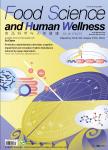2′-Fucosyllactose modulates the function of intestinal microbiota to reduce intestinal permeability in mice colonized by feces from healthy infants
作者机构:Food College, Northeast Agricultural University National Center of Technology Innovation for DairyHohhot Inner Mongolia Yili Industrial Group, Co.Ltd., Yili Maternal and Infant Nutrition Institute (YMINI) Key Laboratory of Dairy Science, Ministry of Education, Northeast Agricultural University
出 版 物:《Food Science and Human Wellness》 (食品科学与人类健康(英文))
年 卷 期:2023年
核心收录:
学科分类:0832[工学-食品科学与工程(可授工学、农学学位)] 08[工学] 083201[工学-食品科学]
摘 要:2′-Fucosyllactose (2’-FL) shows the potential to support intestinal health as a natural prebiotic that bridges the gap between infant formula feeding and breastfeeding. However, the effect and mechanism of 2’-FL in improving intestinal permeability are not clear. In this study, we constructed human microbiota-associated (HMA) mouse models by colonizing healthy infant feces in mice with antibiotic-depleted intestinal microbiota. The protective effect of 2’-FL on the intestinal permeability was explored using the HMA mouse models, and the combination of metagenomics was used to analyze the possible mechanisms by which the microorganisms reduced the intestinal permeability. The results showed that 2’-FL decreased the concentration of markers of intestinal permeability (enterotoxin and DAO) and increased the expression levels of tight junctions (occludin and claudin). Metagenomics revealed the enrichment of Bifidobacterium and increased the expression of glycoside hydrolases (GHs), including GH31, GH28, and GH5. In conclusion, 2’-FL strengthened intestinal permeability function by improving microbiota composition to control the translocation of harmful substance.



